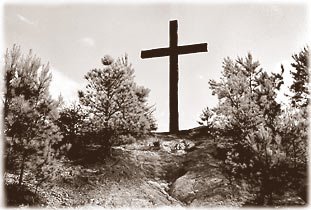"The Cross--Our Glory," which was delivered on Sept. 13, 1855.
“But God forbid that I should glory, save in the cross of our Lord Jesus Christ, by whom the world is crucified unto me, and I unto the world.”
— Galatians 6:14
 O my hearers, hear ye the voice of wisdom, which crieth, “He that glorieth, let him glory only in the Lord.” To live for personal glory is to be dead while we live. Be not so foolish as to perish for a bubble. Many a man has thrown his soul away for a little honor, or for the transient satisfaction of success in trifles. O men, your tendency is to glory in somewhat; your wisdom will be to find a glory worthy of an immortal mind.
O my hearers, hear ye the voice of wisdom, which crieth, “He that glorieth, let him glory only in the Lord.” To live for personal glory is to be dead while we live. Be not so foolish as to perish for a bubble. Many a man has thrown his soul away for a little honor, or for the transient satisfaction of success in trifles. O men, your tendency is to glory in somewhat; your wisdom will be to find a glory worthy of an immortal mind.The Apostle Paul had a rich choice of things in which he could have gloried. If it had been his mind to have remained among his own people, he might have been one of their most honored rabbis. He saith in his Epistle to the Philippians, in the third chapter, “If any other man thinketh that he hath whereof he might trust in the flesh, I more: circumcised the eighth day, of the stock of Israel, of the tribe of Benjamin, an Hebrew of the Hebrews; as touching the law, a Pharisee; concerning zeal, persecuting the church; touching the righteousness which is in the law, blameless.” He says that he profited in the Jews’ religion above many, his equals in his own nation; and he stood high in the esteem of his fellow-professors. But when he was converted to the faith of the Lord Jesus, he said, “What things were gain to me, those I counted loss for Christ. Yea doubtless, and I count all things but loss for the excellency of the knowledge of Christ Jesus my Lord.” As soon as he was converted he forsook all glorying in his former religion and zeal, and cried, “God forbid that I should glory in my birth, my education, my proficiency in Scripture, or my regard to orthodox ritual. God forbid that I should glory, save in the cross of our Lord Jesus Christ.”
Brethren, notice that Paul does not here say that he gloried in Christ, though he did so with all his heart; but he declares that he gloried most in “the cross of our Lord Jesus Christ,” which in the eyes of men was the very lowest and most inglorious part of the history of the Lord Jesus. He could have gloried in the incarnation: angels sang of it, wise men came from the far East to behold it. Did not the new-born King awake the song from heaven of “Glory to God in the highest”? He might have gloried in the life of Christ: was there ever such another, so benevolent and blameless? He might have gloried in the resurrection of Christ: it is the world’s great hope concerning those that are asleep. He might have gloried in our Lord’s ascension; for he “led captivity captive,” and all his followers glory in his victory. He might have gloried in his Second Advent, and I doubt not that he did; for the Lord shall soon descend from heaven with a shout, with the voice of the archangel and the trump of God, to be admired in all them that believe.
Yet the apostle selected beyond all these that center of the Christian system, that point which is most assailed by its foes, that focus of the world’s derision — the cross, and, putting all else somewhat into the shade, he exclaims, “God forbid that I should glory, save in the cross of our Lord Jesus Christ.” Learn, then, that the highest glory of our holy religion is the cross. The history of grace begins earlier and goes on later, but in its middle point stands the cross. Of two eternities this is the hinge: of past decrees and future glories this is the pivot. Let us come to the cross this morning, and think of it, till each one of us, in the power of the Spirit of God, shall say, “God forbid that I should glory, save in the cross of our Lord Jesus Christ.”
I. First, as the Lord shall help me (for who shall describe the: cross without the help of him that did hang upon it?) WHAT DID PAUL MEAN BY THE CROSS? Did he not include under this term, first, the fact of the cross: secondly, the doctrine of the cross: and thirdly, the cross of the doctrine?
I think he meant, first of all, the fact of the cross. Our Lord Jesus Christ did really die upon a gibbet, the death of a felon. He was literally put to death upon a tree, accursed in the esteem of men. I beg you to notice how the apostle puts it — “the cross of our Lord Jesus Christ.” In his epistles he sometimes saith “Christ,” at another time “Jesus,” frequently “Lord,” oftentimes “our Lord”; but here he saith “our Lord Jesus Christ.” There is a sort of pomp of words in this full description, as if in contrast to the shame of the cross. The terms are intended in some small measure to express the dignity of him who was put to so ignominious a death. He is Christ the anointed, and Jesus the Savior; he is the Lord, the Lord of all, and he is “our Lord Jesus Christ.” He is not a Lord without subjects, for he is “our Lord”; nor is he a Savior without saved ones, for he is “our Lord Jesus”; nor has he the anointing for himself alone, for all of us have a share in him as “our Christ”: in all he is ours, and was so upon the cross.
The doctrine is that of a full atonement made, and the utmost ransom paid. “Christ hath redeemed us from the curse of the law, being made a curse for us: for it is written, Cursed is every one that hangeth on a tree.” In Christ upon the cross we see the Just dying for the unjust, that he might bring us to God, the innocent bearing the crimes of the guilty, that they might be forgiven and accepted. That is the doctrine of the cross, of which Paul was never ashamed.
This also is a necessary part of the doctrine: that whosoever believeth in him is justified from all sin; that whosoever trusts in the Lord Jesus Christ is in that moment forgiven, justified, and accepted in the Beloved. “As Moses lifted up the serpent in the wilderness, even so must the Son of man be lifted up; that whosoever believeth in him should not perish, but have eternal life.” Paul’s doctrine was, “It is not of him that willeth, nor of him that runneth, but of God that showeth mercy”; and it was his constant teaching that salvation is not of doings, nor of ceremonies, but simply and alone by believing in Jesus. We are to accept by an act of trust that righteousness which is already finished and completed by the death of our blessed Lord upon the cross. He who does not preach atonement by the blood of Jesus does not preach the cross; and he who does not declare justification by faith in Christ Jesus has missed the mark altogether. This is the very bowels of the Christian system. If our ministry shall be without blood it is without life, for “the blood is the life thereof.” He that preacheth not justification by faith knows not the doctrine of grace; for the Scripture saith, “Therefore it is of faith that it might be by grace; to the end the promise might be sure to all the seed.” Paul gloried both in the fact of the cross and in the doctrine of the cross.
But the apostle also gloried in the cross of the doctrine, for the death of the Son of God upon the cross is the crux of Christianity. Paul did not blench before the sharp and practical reply of the conquerors of the world. He trembled not before Nero in his palace. Whether to Greek or Jew, Roman or barbarian, bond or free, he was not ashamed of the gospel of Christ, but gloried in the cross. Though the testimony that the one all-sufficient atonement was provided on the cross stirs the enmity of man, and provokes opposition, yet Paul was so far from attempting to mitigate that opposition, that he determined to know nothing save Jesus Christ and him crucified. His motto was “We preach Christ crucified.” He had the cross for his philosophy, the cross for his tradition, the cross for his gospel, the cross for his glory, and nothing else.
Why did Paul thus glory in the cross? You may well desire to know, for there are many nowadays who do not glory in it, but forsake it. Alas that it should be so! but there are ministers who ignore the atonement; they conceal the cross, or say but little about it. You may go through service after service, and scarce hear a mention of the atoning blood; but Paul was always bringing forward the expiation for sin: Paul never tried to explain it away. Oh the number of books that have been written to prove that the cross means an example of self-sacrifice, as if every martyrdom did not mean that. They cannot endure a real substitutionary sacrifice for human guilt, and an effectual purgation of sin by the death of the great substitute. Yet the cross means that or nothing. Paul was very bold: although he knew this would make him many enemies, you never find him refining and spiritualizing: the cross and the atonement for sin is a plain matter of fact to him. Neither does he attempt to decorate it by adding philosophical theories. He pronounces an anathema on all who propose a rival theme — “But though we, or an angel from heaven, preach any other gospel unto you than that which we have preached unto you, let him be accursed.”
But we glory because on the cross we have an unexampled display of God’s love. “God commendeth his love toward us, in that, while we were yet sinners, Christ died for us.” Oh to think of it, that he who was offended takes the nature of the offender, and then bears the penalty due for wanton transgression. He who is infinite, thrice holy, all glorious, for ever to be worshipped, yet stoopeth to be numbered with the transgressors, and to bear the sin of many. The mythology of the gods of high Olympus contains nothing worthy to be mentioned in the same day with this wondrous deed of supreme condescension and infinite love. The ancient Shasters and Vedas have nothing of the kind. The death of Jesus Christ upon the cross cannot be an invention of men; none of the ages have produced aught like it in the poetic dreams of any nation. If we did not hear of it so often, and think of it so little, we should be charmed with it beyond expression. If we now heard of it for the first time, and seriously believed it, I know not what we should not do in our glad surprise; certainly we should fall down and worship the Lord Jesus, and continue to worship him for ever and ever.

I believe again, thirdly, that Paul delighted to preach the cross of Christ as the removal of all guilt. He believed that the Lord Jesus on the cross finished transgression, made an end of sin, and brought in everlasting righteousness. He that believeth in Jesus is justified from all things from which he could not be justified by the law of Moses. Since sin was laid on Jesus, God’s justice cannot lay it upon the believing sinner. The Lord will never punish twice the same offense. If he accepts a substitute for me, how can he call me to his bar and punish me for that transgression, for which my substitute endured the chastisement? Many a troubled conscience has caught at this and found deliverance from despair. Wonder not that Paul gloried in Christ, since it is written, “In the Lord shall all the seed of Israel be justified, and shall glory.” This is the method of salvation which completely and eternally absolves the sinner, and makes the blackest offender white as snow. Transgression visited upon Christ has ceased to be, so far as the believer is concerned. Doth not faith cry, “Thou wilt cast all their sins into the depths of the sea”? O sirs, there is something to glory in in this, and those who know the sin-removing power of the cross will not be hindered in this glorying by all the powers of earth or hell.
He glories in it, again, as a marvel of wisdom. It seemed to him the sum of perfect wisdom and skill. He cried, “O the depths of the riches both of the wisdom and knowledge of God!” The plan of salvation by vicarious suffering is simple, but sublime. It would have been impossible for human or angelic wisdom to have invented it. Men already so hate it and fight against it that they never would have devised it. God alone out of the treasury of His infinite wisdom brought forth this matchless project of salvation for the guilty through the substitution of the innocent. The more we study it, the more we shall perceive that it is full of teaching.
Again, Paul, I believe, gloried in the cross, as I often do, because it was the source of rest to him and to his brethren. I make this confession, and I make it very boldly, that I never knew what rest of heart truly meant till I understood the doctrine of the substitution of our Lord Jesus Christ. Now, when I see my Lord bearing away my sins as my scapegoat, or dying for them as my sin-offering, I feel a profound peace of heart and satisfaction of spirit. The cross is all I ever want for security and joy. Truly, this bed is long enough for a man to stretch himself on it. The cross is a chariot of salvation, wherein we traverse the high road of life without fear. The pillow of atonement heals the head that aches with anguish. Beneath the shadow of the cross I sit down with great delight, and its fruit is sweet unto my taste. I have no impatience even to haste to heaven while resting, beneath the cross, for our hymn truly says:
“Here it is I find my heaven,While upon the cross gaze.”
I am sure Paul gloried in the cross yet again because he saw it to be the creator of enthusiasm. Christianity finds its chief force in the enthusiasm which the Holy Ghost produces; and this comes from the cross. The preaching of the cross is the great, weapon of the crusade against evil. In the old times vast crowds came together in desert places, among the hills, or on the moors, at peril of their lives, to hear preaching. Did they come together to hear philosophy? Did they meet at dead of night when the harriers of persecution were hunting them, to listen to pretty moral essays? I trow not. They came to hear of the grace of God manifest in the sacrifice of Jesus to believing hearts. Would your modern gospel create the spirit of the martyrs? Is there anything in it for which a man might go to prison and to death? The modern speculations are not worth a cat’s dying for them much less a man. A something lies within the truth of the cross which sets the soul aglow; it touches the preacher’s lips as with a live coal, and fires the hearer’s hearts as with flame from the alter of God. We can on this gospel live, and for this gospel die. Atonement by blood, full deliverance from sin, perfect safety in Christ given to the believer, call a man to joy, to gratitude, to consecration, to decision, to patience, to holy living, to all-consuming zeal. Therefore in the doctrine of the cross we glory, neither will we be slow to speak it out with all our might.
III. My time has gone, or else I had intended to have enlarged upon the third head, of which I must now give you the mere outline. One of Paul’s great reasons for glorying in the cross was its action upon himself. WHAT WAS ITS EFFECT UPON HIM?
The cross is never without influence. Come where it may, it worketh for life or for death. Wherever there is Christ’s cross there are also two other crosses. On either side there is one, and Jesus is in the midst. Two thieves are crucified with Christ; and Paul tells us their names in his case: “the world is crucified to me, and I unto the world.” Self and the world are both crucified when Christ’s cross appears and is believed in. Beloved, what does Paul mean? Does he not mean just this — that ever since he had seen Christ he looked upon the world as a crucified, hanged up, gibbeted thing, which had no more power over Paul than a criminal hanged upon a cross. What power has a corpse on a gibbet? Such power had the world over Paul. The world despised him, and he could not go after the world if he would, and would not go after it if he could. He was dead to it, and it was dead to him; thus there was a double separation.
How does the cross do this? To be under the dominion of this present evil world is horrible; how does the cross help us to escape? Why, brethren, he that has ever seen the cross looks upon the world’s pomp and glory as a vain show. The pride of heraldry and the glitter of honor fade into meanness before the Crucified One. O ye great ones, what are your silks, and your furs, and your jewellery, and your gold, your stars and your garters, to one who has learned to glory in Christ crucified! The old clothes which belong to the hangman are quite as precious. The world’s light is darkness when the Sun of Righteousness shines from the tree. What care we for all the kingdoms of the world and the glory thereof when once we see the thorn-crowned Lord? There is more glory about one nail of the cross than about all the scepters of all kings. Let the knights of the Golden Fleece meet in chapter, and all the Knights of the Garter stand in their stalls, and what is all their splendor? Their glories wither before the inevitable hour of doom, while the glory of the cross is eternal Everything of earth grows dull and dim when seen by cross light. So was it with the world’s approval. Paul would not ask the world to be pleased with him, since it knew not his Lord, or only knew him to crucify him. Can a Christian be ambitious to be written down as one of the world’s foremost men when that world cast out his Lord? They crucified our Master; shall his servants court their love? Such approval would be all distained with blood. They crucified my Master, the Lord of glory; do I want them to smile on me, and say to me, “Reverend Sir” and “Learned Doctor”? No, the friendship of the world is enmity with God, and therefore to be dreaded. Mouths that spit on Jesus shall give me no kisses. Those who hate the doctrine of the atonement hate my life and soul, and I desire not their esteem.
And so it was with the world’s pursuits. Some ran after honor, some toiled after learning, others labored for riches; but to Paul these were all trifles since he had seen Christ on the cross. He that has seen Jesus die will never go into the toy business; he puts away childish things. A child, a pipe, a little soap, and many pretty bubbles: such is the world. The cross alone can wean us from such play.
And so it was with the world’s pleasures and with the world’s power. The world, and everything that belonged to the world, had become as a corpse to Paul, and he was as a corpse to it. See where the corpse swings in chains on the gibbet. What a foul, rotten thing! We cannot endure it! Do not let it hang longer above ground to fill the air with pestilence. Let the dead be buried out of sight. The Christ that died upon the cross now lives in our hearts. The Christ that took human guilt has taken possession of our souls, and henceforth we live only in him, for him, by him. He has engrossed our affections. All our ardours burn for him. God make it to be so with us, that we may glorify God and bless our age.
Paul concludes this epistle by saying, “From henceforth let no man trouble me: for I bear in my body the marks of the Lord Jesus.” He was a slave, branded with his Master’s name. That stamp could never be got out, for it was burned into his heart. Even thus, I trust, the doctrine of the atonement is our settled belief, and faith in it is part of our life. We are rooted and grounded in the unchanging verities. Do not try to convert me to your new views; I am past it. Give me over. You waste your breath. It is done: on this point the wax takes no farther impress. I have taken up my standing, and will never quit it. A crucified Christ has taken such possession of my entire nature, spirit, soul, and body, that I am henceforth beyond the reach of opposing arguments.
Brethren, sisters, will you enlist under the conquering banner of the cross? Once rolled in the dust and stained in blood, it now leads on the armies of the Lord to victory! Oh that all ministers would preach the true doctrine of the cross! Oh that all Christian people would live under the influence of it, and we should then see brighter days than these! Unto the Crucified be glory for ever and ever. Amen.

Next: Spurgeon's "The Resurrection of our Lord Jesus."



No comments:
Post a Comment